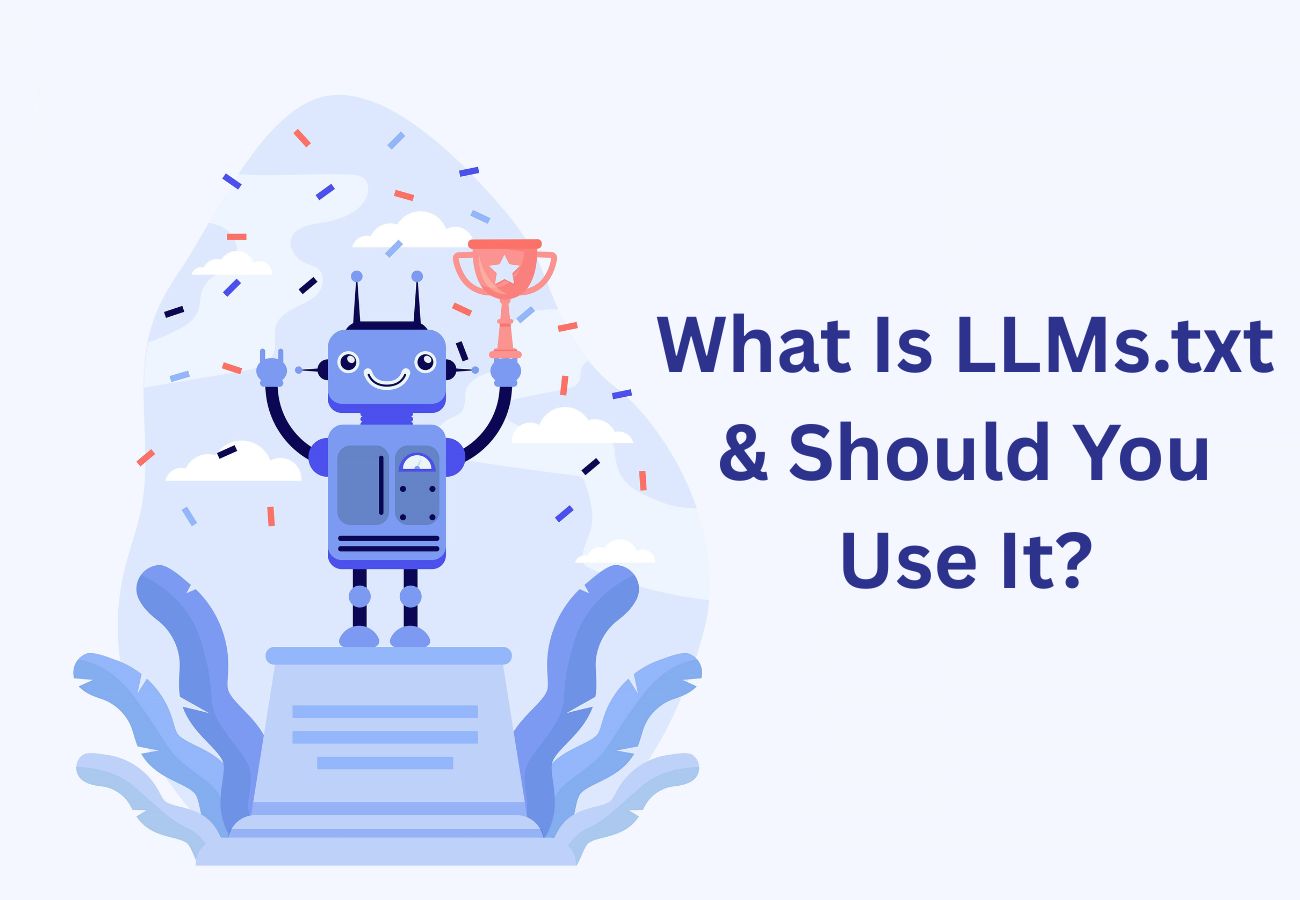
What Is LLMs.txt & Should You Use It?
Imagine this: You’ve spent hours crafting the perfect blog post, carefully selecting every word to share your knowledge. Then one day, you discover an AI chatbot casually spitting out your hard work – not just the ideas, but sometimes even your exact phrasing – without credit or compensation. This isn’t a hypothetical scenario; it’s happening right now across the internet.
Enter LLMs.txt – a simple but potentially powerful tool that puts a “Do Not Disturb” sign on your digital content for AI companies. Think of it like the “robots.txt” file you might have heard about, but specifically designed for the age of AI. It is basically a plain text file you can add to your website that gives instructions to companies and developers who train large language models (LLMs), like ChatGPT or other AI systems, about whether they can use your website’s content for training. The idea is to give website owners more control over how their words, images, and other materials that are used by AI companies.
The AI Gold Rush and Your Content Is the Gold
AI doesn’t magically “know” things. It learns by devouring mountains of online text-books, blogs, forums, you name it. The problem? Much of this feasting happens without permission.
Journalists wake up to find AI summaries of their paywalled articles.
Small businesses see their product descriptions recycled in chatbot replies.
Programmers watch their open-source code get absorbed into AI tools that then compete with them.
It’s like someone photocopying your diary, selling it as their own novel, and saying, “Well, you left it on your desk!”
Why This Matters Now More Than Ever
Every time you publish online – whether it’s a professional portfolio, a personal blog, or a business website – there’s a chance AI companies are quietly using your work to train their models. While some view this as fair game because after all, it’s publicly available, others feel it crosses a line, especially when:
- Original creators get no credit
- Paywalled or proprietary content gets scooped up
- Small businesses find AI competing with their own services
LLMs.txt gives you a way to at least state your preferences clearly, even if enforcement is still evolving.
How It Works
Create a simple text file named “llms.txt” (no fancy software needed)
Write plain English rules like:
- “ChatGPT: Please don’t train on my content”
- “All AI models: Feel free to learn from my blog posts”
Upload it to your website’s main folder
That’s it. When AI companies crawl your site if they choose to play nice, they’ll see your instructions.
The Big Question: Does It Actually Work?
Here’s the honest truth:
The Good: It’s better than nothing. Some AI companies may respect it, especially as public pressure grows.
The Reality: There’s no guarantee all companies will comply with it yet.
The Smart Move: Combine it with other protections like clear copyright notices.
Who Should Use This Right Now?
✔ Writers & Artists who want to protect their unique voice
✔ Small Businesses with proprietary how-to guides or product details
✔ Anyone who believes consent should matter in the AI age
Even if adoption is slow, adding LLMs.txt:
- Takes just minutes
- Makes your stance clear
- Helps build the norm that content creators deserve a say
Whether you should use it or not that depends on your goals:
- If you don’t want your content used for AI training, then yes – it’s worth adding an LLMs.txt file to protect your work.
- If you don’t mind or even want AI to learn from your site (for visibility or sharing purposes), you can skip it or set it to “allow.”
- Keep in mind, it’s voluntary as mentioned earlier not all AI companies may follow it yet. It’s more of a signal than a legally enforceable block.
Why This Isn’t Just a Tech Geek Debate
This isn’t about “stopping progress.” It’s about fairness. Imagine:
- A recipe blogger loses traffic because an AI gives away her signature dish for free.
- A mental health forum’s posts get fed into a chatbot, exposing vulnerable users.
- A novelist finds their unpublished draft snippets in an AI’s responses.
Without guardrails, the internet – built by people becomes a free buffet for corporations.
The Bigger Picture: Who Controls the Internet’s Brain?
This isn’t just about one text file. It’s about asking:
“Should a handful of tech companies get to decide how humanity’s knowledge is used?”
LLMs.txt won’t solve everything. But it’s a start – a way for individuals and small players to say:
“My work isn’t just free training data.”
The bottom line? If you care about how your online work gets used, it’s worth spending those five minutes to add LLMs.txt as these might not be a perfect solution today, it represents an important first step toward balancing innovation with creator rights.At worst, it does nothing. At best, it could help protect your digital legacy as the rules catch up with technology.
Because if we don’t draw the line now, we might not get another chance.
If you’re using digital marketing services to grow your brand, consider adding LLMs.txt as part of your broader approach to protecting and maximizing the value of your online work.
Follow us
Recent post
Popular post
- How To Call Batch Apex By Scheduler Class Within Salesforce
- What Is The Importance Of Google Algorithm Updates
- How To Create Dynamic Dependent Picklist Of Objects Within Salesforce
- What Is Wrapper Class & How To Use It In Salesforce
- How To Create Pagination Within Salesforce
- Tips For Hiring A Good Offshore Drupal Development Company
- Web Development Mistakes That Affect Your Online Reputation
- How To Integrate Google Maps Into Your Salesforce Software
- Check Your Link Building Strategy For 2014
- Tips For Selling Products Through Social Networking
- How To Create A Chart With Salesforce
- Benefits of Using India For Outsourcing & Offshore Development
- How To Integrate Salesforce With Facebook
- What Is Service Cloud Console In Salesforce & How To Enable It
- Superior Offshore Web Development At A Reasonable Cost
- How To Create Bucket Fields In Your Salesforce Reports
- 5 Things To Consider When Hiring A Drupal Developer
- Growth Of E-commerce Website Development
- Challenges In Hiring An Offshore Web Development Company
- 10 Tips When Creating Batch Apex In Salesforce
- What To Include & What To Exclude In SEO Plans
- How To Create An Opportunity Using A Visualforce Page In Salesforce
- Hire An Offshore Ruby On Rails Development Company Over A Freelancer
- Hire Drupal Developers Offshore To Increase Your Capabilities
- Effective SEO In A Post Panda Update – The Rules Have Changed
- Common Mistakes In Offshore Web Development
- What To Consider While Hiring A Dedicated Ruby On Rails Developer?
- Smart Phone & Tablet User Penetration
- Tips For Hiring A Good Offshore PHP Development Company
- Why Responsive Web Design Is Essential For Your Business
- How To Email Documents From Salesforce
- Website Development And Website Design Company India
- Why Work With An Offshore Development Company?
- How To Create Tab Panel In Salesforce
- How To Avoid 5 Common Off-Page SEO Mistakes
- The Multi-Billion Dollar Offshore Software Development Industry
- What Are The Advantages Of Digital Marketing Over Traditional Marketing?
- SEO & Conversational Keyword Search
- How To Avoid 5 Common On-Page SEO Mistakes
- How To Add Google Authorship And Its Benefits For Better SEO
- What’s Better For Facebook Ads: CPC Or CPM?
- Questions To Ask Your Potential Search Engine Optimization Partner
- How To Create Batch Apex In Salesforce
- Benefits Of Offshore PHP Development For Your Businesses
- Offshore Magento Development Means More Than Just Development Help
- Why You Should Consider Hiring Joomla Developers Offshore
- What To Look For When Hiring A Dedicated OpenCart Developer
- Stop Using Free Web Templates – Hire A Web Development Company
- How To Manage An Offshore Development Company?
- Hire Offshore Software Professionals To Help Your Business
- Offshore Development Is A Sensible Solution For Recessionary Times
- Why You Should Offshore Your Joomla Website Development
- 5 Tips To Help You Hire A Good Offshore PHP Development Company
- Reasons Why Salesforce CRM Customization Is Easy
- PHP Development – Turn Your Website Into A Multi-Featured Web Application
- 5 Things To Ask A Web Development Company Before Starting Work
- How A Multifaceted Web Development Company Can Help You?
- Take Advantage By Hiring A PHP Development Company From India
- Use Social Media Marketing To Improve Your Brand Identity
- Hiring Dedicated Developers From Offshore Development Companies
- See Measurable Results By Hiring Dedicated Ruby On Rails Developer
- Avoid 4 Common WordPress Development Mistakes
- Can “Developed By” Links Hurt Your SEO?
- How To Get All Salesforce Components In Force.com IDE
- The Manifold Advantages Of Working With An Offshore Web Development Company
- Web Development Company In India Defined
- Hire A Dedicated Drupal Developer To Develop A High Performance CMS
- Offshore Development – The Most Beneficial And Cost Effective Way To Outsource Your Business
- What To Look For When Hiring An Offshore Development Company
- Why Dedicated PHP Web Developers Are In Demand
- How To Avoid Some Common Mistakes When Working With An Offshore Web Development Company
- How To Choose An SEO Company
- Factors To Consider When Hiring Offshore Developers In India
- What To Look For When Hiring Dedicated Magento Developers
- Why Google Create Its Own Title Instead Of Using Yours
- 3 Challenges of Working with an Offshore Web Development Company
- Why Ruby On Rails Development Has Become Popular
- Why Hire A Web Development Company That Also Offers SEO
- 10 Tips And Tricks For Salesforce
- Are Back-links Losing Their Importance To Google Search Rankings
- The Significance Of A Salesforce Developer
- 4 Reasons to Hire A Web Development Agency Over A Freelancer
- Hire A PHP Developer- How Outsourcing Can Be A Key To Success
- Importance Of Strategic Digital Marketing For Business Growth
- Factors To Keep In Mind Before Hiring Dedicated Magento Developer
- Web Development India – For Prompt And Accurate Services
- Looking For An Offshore PHP Development Company, Where Do I Begin?
- 5 SEO Myths
- How To Choose A Company When Hiring Dedicated PHP Developers
- Why You Should Optimize For Local Search
- Hiring Offshore WordPress Developers Can Help Your Business
- How To Use Social Networking To Market Your Business
- Why Offshore Web Development To India Makes Business Sense
- 5 Factors To Consider When Hiring A Web Development Company
- Top Five Benefits Of Salesforce
- Benefits Of Hiring A Dedicated PHP Developer From India
- Using SEO & Social Media Together
- How Can An SEO Company Help Your Profile Online
- Strategic Importance Of Mobile SEO
- Choose The Social Media Network That Suits Your Business
Archives
- March 2026
- February 2026
- January 2026
- December 2025
- November 2025
- October 2025
- September 2025
- August 2025
- July 2025
- June 2025
- May 2025
- April 2025
- March 2025
- February 2025
- January 2025
- December 2024
- November 2024
- October 2024
- September 2024
- July 2024
- June 2024
- May 2024
- April 2024
- March 2024
- February 2024
- September 2023
- August 2023
- July 2023
- June 2022
- May 2022
- March 2022
- January 2022
- August 2021
- July 2021
- June 2021
- May 2021
- January 2021
- December 2020
- September 2020
- August 2020
- July 2020
- June 2020
- April 2020
- March 2020
- December 2019
- November 2019
- October 2019
- September 2019
- August 2019
- July 2019
- June 2019
- May 2019
- April 2019
- March 2019
- February 2019
- January 2019
- December 2018
- November 2018
- September 2018
- April 2018
- February 2018
- January 2018
- September 2017
- August 2017
- July 2017
- June 2017
- May 2017
- April 2017
- March 2017
- February 2017
- January 2017
- December 2016
- November 2016
- October 2016
- September 2016
- August 2016
- July 2016
- June 2016
- May 2016
- April 2016
- March 2016
- February 2016
- January 2016
- December 2015
- November 2015
- October 2015
- September 2015
- August 2015
- July 2015
- June 2015
- May 2015
- April 2015
- March 2015
- February 2015
- January 2015
- December 2014
















